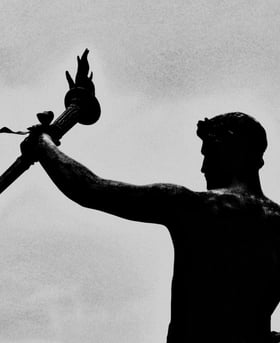Pai-Fasso
Pai-Fasso. The central archetype of ORIANO.
Saying no to the phenomenon of speech yields the ability to have a revolutionary character. Disobedience returns to the personality the character of revolution. Obedience, as an act, is derived from the initial disobedience. Greek and Hebrew mythology testifies. Eve, rather than saying yes to obedience, said yes to disobedience. Still, it was a resounding rejection. The capacity of its revolutionary character convinces the man to follow.
This is a story about the mythological output figurative of the mother's womb, the foetus representative of the pre- human, pre-historic, even pre-conscious and pre-individualist one.
The return is denied as unauthorized from the origins of the myth. To return, to go back, man is incapable. And so begins a new awareness that existed before as a harmony with the primordial, a harmony that man can not go to the man who is the master of nature according to its survival, the man as separate from his enlightenment.
Freedom is the act of initial disobedience; he casts the chains of the old order of their fief.
Prometheus is the symbol of Greek mythology to the disobedience of man but also the mastery of nature referring to the acquisition of the art of making fire. The beginning of civilization is by this act of disobedience.
Prometheus has two faces. On the one hand, Prometheus is part of the Olympian order of hegemony. But then, Prometheus attracts chthonic powers in rebellion against the new formalism of the Olympian pantheon and his regime of order.
There is no current research on the figure of Pai-Fasso (Latin, Fax). Pai-Fasso is of Greek origin and is synonymous with Prometheus. Pai-Fasso is the fire bearer, the torchbearer, protesting against the way of the Olympian order. As mentioned earlier, the Olympian order represents hegemony. The only way to challenge the established order is to introduce an unknown archetype in system operation. Gods reconciled fight by the victory of the Earth, this reconciliation of mercy, humanity, innocence and trust. The psychoanalytic view of Pai-Fasso is one of maturity and a quest for identity. Fire represents Pai-Fasso itself, its identification, purification and
sanctification since individuality is obscured by the terror of having to be a person. The individual. Freedom (as an act of disobedience) is considered a crime against God because it is God who has all individuality, all power, all freedom.
If it is Prometheus who should ascend to heaven to steal from God, we can say that subsequent Hebrew mythos borrowed directly from the Greek myth earlier.
If everything is but self then there may be no gaps in the other. The Eleutherian (see personality types), whose virtue is selfhood and individuality, requires the fire that is his by right of conquest, the same fire that burns like that of Pai- Fasso.
§




